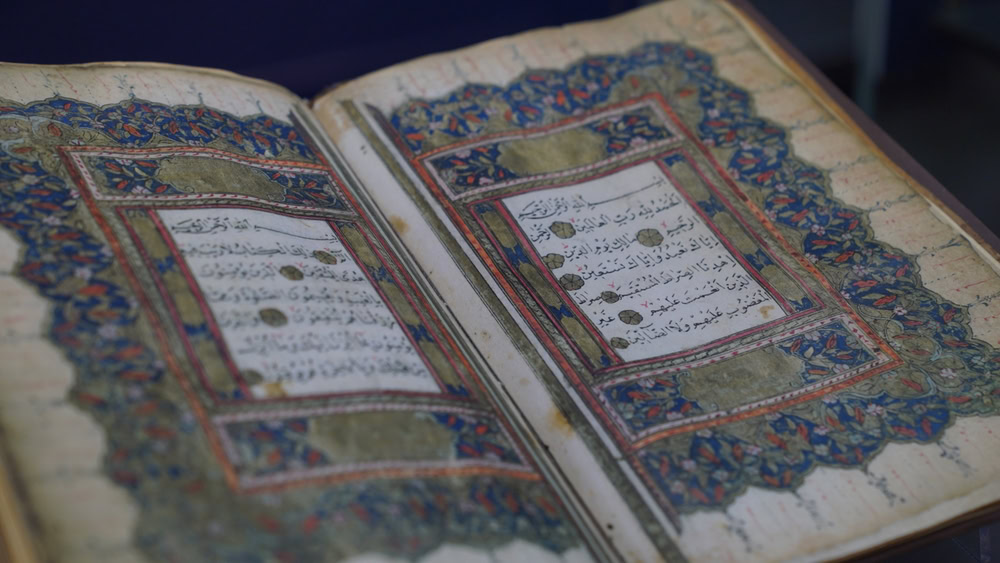What Is the Methodology Used in Interpreting the Quran with the Quran?
Answered by Shaykh Anas al-Musa
Question
What is the methodology used in interpreting the Quran with the Quran?
Answer
In the name of Allah, the Most Gracious, the Most Merciful.
All praise is due to Allah, Lord of all worlds. Peace and blessings be upon the Messenger sent as a mercy to the worlds, our Master and Prophet, Muhammad, and his Family and Companions.
The methodology of interpreting the Quran with the Quran is one of the best methods of tafsir (Quranic exegesis). This is because it involves explaining the words of Allah (Most High) through His own words, and there is no one more knowledgeable about the intent behind a statement than the speaker himself.
Some of the key approaches in interpreting the Quran with the Quran include:
Clarifying the Concise with the Detailed
One of the approaches is to explain concise or brief narratives in the Quran with their more detailed versions found elsewhere in the Quran. For example, the story of Adam and Iblis (Satan) is presented in a summarized form in some places and in a more elaborate and extended form in others.
Similarly, the story of Musa (Moses) and Pharaoh is concise in certain passages but extensive and detailed in others.
Explaining the Ambiguous with the Clear
Another approach is to interpret the ambiguous or general terms by referring to other verses that provide clear or detailed explanations. An example of this is found in Surat Ghafir:
“But if he is truthful, then you will be afflicted with some of what he is threatening you with.” [Quran, 40:28]
This verse can be understood as referring to the immediate punishment in this world (the lesser punishment), as clarified in the later verse of the same sura:
“Whether We show you some of what We threaten them with, or cause you to die (before that), to Us they will (all) be returned.” [Quran, 40:77]
Reconciling Apparent Differences
A further approach is to reconcile what might appear to be differing or conflicting descriptions. For instance, Adam’s creation is described variously in the Quran as being from dust, clay, dark mud altered, and dried clay like pottery. These different descriptions refer to the various stages of Adam’s creation, from the beginning to the point when the soul was breathed into him.
Lastly, interpreting the Quran with the Quran is a characteristic feature of certain books of tafsir. Among the most prominent are:
- Jami‘ al-Bayan ‘an Ta’wil Ay al-Quran by Tabari, who passed away in 310 AH.
- Tafsir al-Quran al-‘Azim Musnadan ‘an Rasulillah wa al-Sahaba wa al-Tabi‘in by Imam ‘Abd al-Rahman al-Razi, who passed away in 327 AH.
I advise you if you wish to learn more about the methodology of interpreting the Quran with the Quran to refer to the book “al-Tafsir wa al-Mufassirun” by Dr. Muhammad al-Sayyid Hussayn al-Dhahabi (d. 1398 AH). It is also beneficial to consult works on the sciences of the Quran, such as ‘Ulum al-Quran by Dr. Nur al-Din ‘Itr (Allah have mercy on him).
May Allah bless the Prophet Muhammad and give him peace, and his Family and Companions.
[Shaykh] Anas al-Musa
Shaykh Anas al-Musa, born in Hama, Syria, in 1974, is an erudite scholar of notable repute. He graduated from the Engineering Institute in Damascus, where he specialized in General Construction, and Al-Azhar University, Faculty of Usul al-Din, where he specialized in Hadith.
He studied under prominent scholars in Damascus, including Shaykh Abdul Rahman al-Shaghouri and Shaykh Adib al-Kallas, among others. Shaykh Anas has memorized the Quran and is proficient in the ten Mutawatir recitations, having studied under Shaykh Bakri al-Tarabishi and Shaykh Mowfaq ‘Ayun. He also graduated from the Iraqi Hadith School.
He has taught numerous Islamic subjects at Shari‘a institutes in Syria and Turkey. Shaykh Anas has served as an Imam and preacher for over 15 years and is a teacher of the Quran in its various readings and narrations.
Currently, he works as a teacher at SeekersGuidance and is responsible for academic guidance there. He has completed his Master’s degree in Hadith and is now pursuing his Ph.D. in the same field. Shaykh Anas al-Musa is married and resides in Istanbul.
